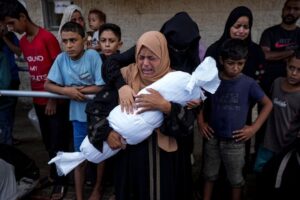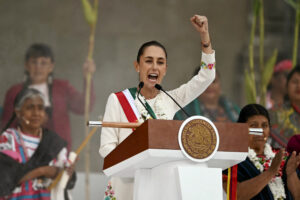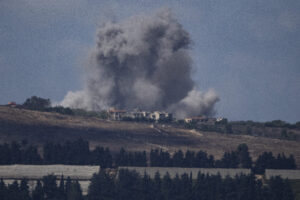Israel Presses Forward On Two Fronts And Reports 8 Combat Deaths As Fears Of A Wider War Mount
Israel pressed forward on two fronts Wednesday, pursuing a ground incursion into Lebanon against Hezbollah that left eight Israeli soldiers dead.
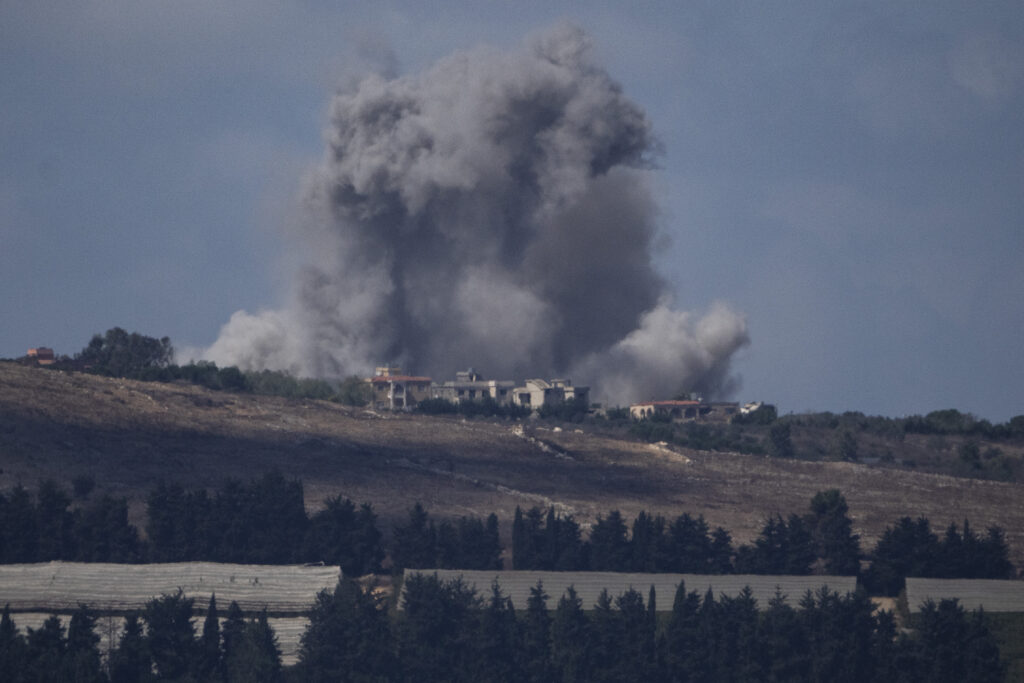
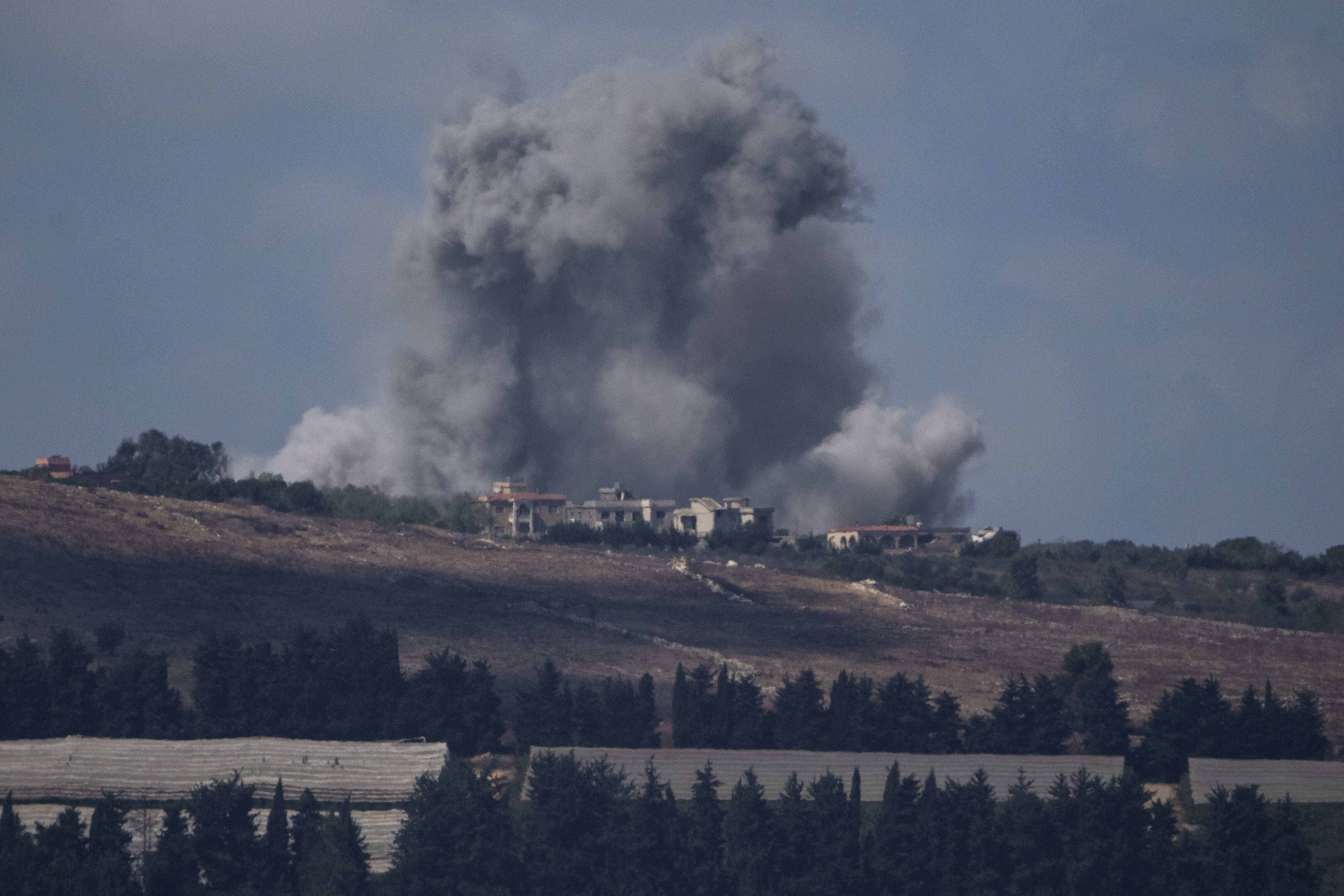
BEIRUT (AP) — Israel pressed forward on two fronts Wednesday, pursuing a ground incursion into Lebanon against Hezbollah that left eight Israeli soldiers dead and conducting strikes in Gaza that killed dozens, including children. As Israel vowed to retaliate for Iran’s ballistic missile attack a day earlier, the region braced for further escalation.
Iran, which backs both Hezbollah and the Hamas militants who run the Gaza Strip, launched dozens of missiles into Israel on Tuesday night, another escalation in a tit-for-tat cycle that is pushing the Middle East closer to a regional war. Israel warned that the attack would have “repercussions.”
The Israeli military said seven soldiers were killed in two Hezbollah attacks in southern Lebanon on Wednesday, without elaborating. The deaths followed an earlier announcement of the first Israeli combat death in Lebanon since the start of the incursion — a 22-year-old captain in a commando brigade. Another seven troops were wounded.
Together, the deaths announced on the eve of Rosh Hashana, the Jewish new year, were some of the biggest casualties sustained by Israeli forces in months.
In Gaza, where the nearly yearlong war that triggered the widening conflict rages with no end in sight, Israeli ground and air operations in the territory’s second-largest city of Khan Younis killed at least 51 people, including women and children, Palestinian medical officials said.
And late Wednesday night, an Israeli airstrike hit an apartment building near the Lebanese capital’s city center, the second time Israel has struck central Beirut this week. At least six people were killed and seven wounded in the residential Bashoura district.
Residents reported a sulfur-like smell following the attack, and Lebanon’s state-run National News Agency accused Israel of using internationally banned phosphorous bombs. Human rights groups have in the past accused Israel of using white phosphorus incendiary shells on towns and villages in conflict-hit southern Lebanon.
Multiple strikes were also reported in Beirut’s southern suburbs in areas issued evacuation warnings by the Israeli army. The area struck in central Beirut was not covered in those warnings.
The latest actions on multiple fronts have raised fears of a wider conflict that could draw in Iran as well as the United States, which has rushed military assets to the region in support of Israel.
Meanwhile, Syria’s state-run SANA news agency said an Israeli airstrike hit a residential building in Damascus on Wednesday evening, killing three people and wounding at least three others. An Associated Press journalist at the scene said the missile appeared to have targeted the bottom floor of a four-story apartment building.
There was no immediate comment from Israel, which frequently hits targets linked to Iran or allied groups in Syria, but rarely claims the strikes.
Hezbollah says its fighters clashed with Israeli troops
Hezbollah, widely seen as the most powerful Iranian-armed group in the region, said its fighters clashed with Israeli troops in two places inside Lebanon near the border. The Israeli military said ground forces backed by airstrikes killed militants in “close-range engagements,” without saying where.
Israeli media reported infantry and tank units operating in southern Lebanon after the military sent thousands of additional troops and artillery to the border.
The Israeli soldiers’ deaths announced Wednesday followed other military losses this year. In June, an explosion in southern Gaza killed eight Israeli soldiers. In January, 21 Israeli troops were killed in a single attack by Palestinian militants in central Gaza, the deadliest single attack on Israeli forces since the Israel-Hamas war erupted almost a year ago.
The Israeli military warned people in 50 Lebanese villages and towns to evacuate north of the Awali River, some 60 kilometers (37 miles) from the border and much farther than the northern edge of a U.N.-declared zone intended to serve as a buffer between Israel and Hezbollah after their 2006 war. Hundreds of thousands have already fled their homes.
Israel has said it will continue striking Hezbollah until it is safe for tens of thousands of its citizens displaced from homes near the Lebanon border to return. Hezbollah has vowed to keep firing rockets into Israel until there is a cease-fire in Gaza.
Israeli strikes have killed more than 1,000 people in Lebanon over the past two weeks, nearly a quarter of them women and children, according to Lebanon’s Health Ministry.
Meanwhile, Israel lashed out at the United Nations, declaring Secretary-General António Guterres persona non grata and banned from entering the country. Israeli Foreign Minister Israel Katz accused him of failing to unequivocally condemn Tuesday night’s Iranian missile attack. The move deepens an already wide rift between Israel and the United Nations.
Palestinians describe massive raid in Gaza
The Health Ministry in Gaza said at least 51 people were killed and 82 wounded in the operation in Khan Younis that began early Wednesday. Records at the European Hospital showed seven women and 12 children, as young as 22 months old, were among those killed.
Another 23 people, including two children, were killed in separate strikes across Gaza, according to local hospitals.
The Israeli military did not immediately respond to a request for comment.
Residents said Israel had carried out heavy airstrikes as its ground forces staged an incursion into three neighborhoods of Khan Younis. Mahmoud al-Razd, whose four relatives were killed, described heavy destruction and said first responders had struggled to reach destroyed homes.
“The explosions and shelling were massive,” he told The Associated Press. “Many people are thought to be under the rubble, and no one can retrieve them.”
Israel carried out a weekslong offensive earlier this year in Khan Younis that left much of the city in ruins. Israeli forces have repeatedly returned to areas of Gaza as militants have regrouped.
On Oct. 7, Hamas-led militants killed some 1,200 people, mostly civilians, in an attack in southern Israel and took around 250 hostage. Some 100 are still held, around 65 of whom are believed to be alive.
Israel’s retaliatory offensive has killed over 41,000 Palestinians, according to the Gaza Health Ministry, which does not differentiate between fighters and civilians but says more than half were women and children. The Israeli military says it has killed over 17,000 militants, without providing evidence.
Iran fires missiles to avenge attacks on militant allies
Iran launched at least 180 missiles into Israel on Tuesday in what it said was retaliation for the devastating blows Israel landed recently against Hezbollah, which has been firing rockets into Israel since the war in Gaza began in solidarity with Hamas.
Israelis scrambled for bomb shelters as air-raid sirens sounded and the orange glow of missiles streaked across the night sky.
The Israeli military said it intercepted many of the incoming Iranian missiles, though some landed in central and southern Israel. Several landed in the Israeli-occupied West Bank, killing a Palestinian man.
Israeli Prime Minister Benjamin Netanyahu vowed to retaliate, saying Iran “made a big mistake tonight and it will pay for it.”
U.S. President Joe Biden said his administration is “fully supportive” of Israel and that he’s discussing with aides what the appropriate response should be.
Iran said it would respond to any violation of its sovereignty with even heavier strikes on Israeli infrastructure.
Iran said it fired the missiles as retaliation for attacks that killed leaders of Hezbollah, Hamas and its own paramilitary Revolutionary Guard. It referenced Hezbollah leader Hassan Nasrallah and Guard Gen. Abbas Nilforushan, both killed in an Israeli airstrike last week in Beirut. It also mentioned Ismail Haniyeh, a top leader in Hamas who was killed in Tehran in a suspected Israeli attack in July.
___
Magdy reported from Cairo. Associated Press writers Wafaa Shurafa in Deir al-Balah, Gaza Strip; Jack Jeffrey in Jerusalem and Melanie Lidman in Tel Aviv, Israel, contributed to this report.
___


